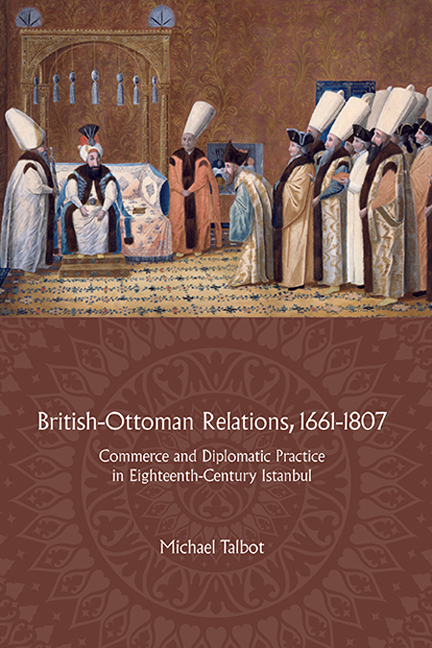 British-Ottoman Relations, 1661-1807
British-Ottoman Relations, 1661-1807 Book contents
- Frontmatter
- Dedication
- Contents
- List of tables and figures
- Acknowledgements
- Note on languages, place names, dates, and currencies
- List of abbreviations
- Introduction: De/re-constructing the history of British–Ottoman relations
- 1 The framework of relations
- 2 The office of ambassador
- 3 Trade and diplomatic finances
- 4 Gift-giving
- 5 Diplomacy as performance
- 6 Negotiating disputes
- Conclusions: De/re-constructing British–Ottoman diplomacy
- Bibliography
- Index
2 - The office of ambassador
Published online by Cambridge University Press: 29 July 2017
- Frontmatter
- Dedication
- Contents
- List of tables and figures
- Acknowledgements
- Note on languages, place names, dates, and currencies
- List of abbreviations
- Introduction: De/re-constructing the history of British–Ottoman relations
- 1 The framework of relations
- 2 The office of ambassador
- 3 Trade and diplomatic finances
- 4 Gift-giving
- 5 Diplomacy as performance
- 6 Negotiating disputes
- Conclusions: De/re-constructing British–Ottoman diplomacy
- Bibliography
- Index
Summary
‘A deviant ambassador is a prey to misfortune’:The ambassador and his duties
In 1797, after almost four years of service, the first Ottoman resident ambassador in London, Yusuf Agah Efendi, received his recall from Istanbul. In an Ottoman translation of a letter from George III (r. 1760–1820) to Selim III, the British government requested that the Ottomans continue to send ambassadors to the Court of St James's. The letter also spoke highly of Yusuf Agah and his abilities:
We came to know from your imperial letter sent to us that the resident official at our court from the Crown-holder, the excellent and wise Yusuf Agah Efendi, is to make his return in accordance with your exalted order. During his residence, the said ambassador strengthened and reinforced beyond all expression the complete concord of love and affection that has happily and blessedly endured and persisted of old between your Sublime State and the state of Britain.
Here, one role of the ambassador, as expressed in an Ottoman translation of a British letter, is clear. Yusuf Agah, ‘excellent and wise’ (izzetlü recāḥetlü), had solidified the bonds of friendship between the two states. This idea of the ambassador was one that was easily translated between the two cultures. It also emphasised that he was part of a historical narrative; this was not just any friendship, but one ‘of old’ (ez-ḳadīm). This echoes the narrative of the Capitulations, where friendship and its maintenance were paramount.
Despite these noble aims in rhetoric, the art of diplomacy has held, at least in the Anglophone world, rather negative connotations. The acerbic wit of Ambrose Bierce's Cynic's Word Book defined diplomacy as ‘the patriotic art of lying for one's country’. Taking things even further, the first Secretary- General of the United Nations, Trygve Lie, suggested that a good diplomat should be able to ‘cut his neighbour's throat without having his neighbour notice’. Negative connotations came early in the word's history, with Edmund Burke, one of the first public figures to make use of the term, employing it several times in his tirade against the prospect of peace with the French Republic in 1796, using expressions such as ‘diplomacy of humiliation’, ‘double diplomacy’, and ‘mendicant diplomacy’. Diplomacy was something distinct from the duties of an ambassador.
- Type
- Chapter
- Information
- British-Ottoman Relations, 1661-1807Commerce and Diplomatic Practice in Eighteenth-Century Istanbul, pp. 43 - 70Publisher: Boydell & BrewerPrint publication year: 2017
